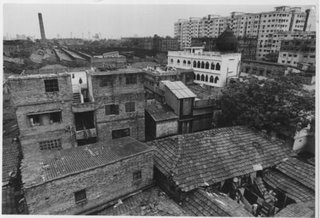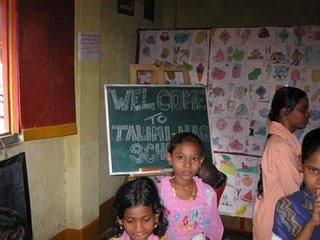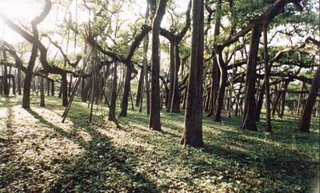 Here is a letter I wrote to a friend in March 2005 about the Talimi Haq School ex-students' reunion.
Here is a letter I wrote to a friend in March 2005 about the Talimi Haq School ex-students' reunion.Yesterday afternoon we had an old students' reunion at the Talimi Haq School in Howrah. I had thought about this for a long time, and also spoken to Amina and Binod who run the school. I had visited Howrah a few days ago after almost 4 months. The school reunion was planned, and it took place on Sunday, 20 March 2005.
It is difficult to express all the feelings from looking, as an observer, at all that had happened since I started working in Howrah in 1996-97. I had been at the Howrah office-centre virtually everyday, 6 days a week, from 1998 to 2000. In mid-2000, after I joined the CALMANAC website assignment, my visits became infrequent. After this assignment was over, for a month or so I again went there everyday. But then I began getting more and more into my new duty / responsibility, the family business. Through 2001 and 2002, I went about once a week. In 2003 and 2004, this became even less frequent. I went only for specific purposes. But I had remained in close and regular contact, with Prodyut, Amina and Binod, and earlier Ranjit and Anguri. And of course I worried about the funds to keep the school running.
To my surprise I learnt that since its inception in June 1998, over 400 children had studied here for some length of time. I was particularly keen that a group of boys who had studied in the very first year attend. I had taught them myself - arithmetic, singing - and developed a close rapport with them.
Some 30-40 ex-students came for the reunion, and together with a good number of the small children currently studying - there was quite a crowd in our school room. It was hot and sweaty inside the room, but that did not affect anybody's enthusiasm. Some boys who had been studying here until quite recently, were now strapping lads. Some girls from a few years ago were now very pretty adolescents. Among them a girl living across the lane who had joined after I had asked her father to send her to our school.
Photographs taken over the years were displayed on a wall - a school function on Independence Day, a picnic to the Botanical Gardens, a visit to the Science Museum, visitors from Britain. Looking at some of the pictures, I felt a lump in my throat and my eyes clouded over. Some of the tiny kids in the pictures were big boys and girls now.
The programme began with a short welcome address by me. I said like every school and college, Talimi Haq School too should have a reunion of the ex-students. They should feel happy and proud to have belonged to a special school, which set them off on their journey in education and life. Where they learnt something, and can remember a time of happiness, fun and frolic. For the current students, it will give them a feeling that they are studying in a special school, which is looked up to and with which ex-students feel an attachment. This a special school as its name proclaims. Education is a right of all, so this is a school for that. So many children have come here and then gone on to other schools, where they are now studying, or have even graduated from. And thus is the stream of education in this locality advancing. The students learn Urdu, English, Arithmetic, cleanliness, good behaviour, correct values. But at root, the teachers here give love and affection to the children. Boys and girls who were unable to continue with their schooling - learnt at least something here. All ex-students should know that this is their place, like their home. And we at the school consider you all as our own. You have a right to this place, it is yours. You can come whenever you want, when you are happy come and share your happiness with us. When you are feeling sad and burdened, come here and find a shoulder to rest on. And you will always be in our thoughts, and we hope you will drop in every now and then. We remember all those who are unable to come today. We remember in particular all the teachers who have taught here over the years and we miss their presence very much. I hope there will be a lot of happiness today, a lot of fun, jokes and anecdotes, remembering of joy and mischief, songs, recollection of old times.
There was a juice break. Several of the small children were given their juice and coaxed to go home to make space for the ex-students. Some of the boys and girls came to chat with me and I enquired about their studies.
A number of skits and songs were then presented by ex-students, which had the audience in splits. A group of boys sang a song I had composed, "PM Basti ke ham sab sachhey Mussalmaan hain" (“we are all true Muslims, from PM Basti”). A video recording of a women and children's rally on International Literacy Day in 1998 was played.
Amina and another new teacher asked me to sing. I sang three songs, including my composition "Hari aur Ali galey miley jab" ("When Hari and Ali embrace"). Finally there was an hour-long antakshari session, between boys and girls, with a male teacher, Binod, and a lady teacher, Rehana as the referees. The competition was fierce, and the enthusiasm quite explosive. The boys exulted in singing out love songs teasingly, but the girls were not going to be outdone in knowledge of songs and singing.
Packets of savouries and sweets had been prepared, to give to everyone - but because many more than estimated had turned up, everyone had to share. Two boys asked me to share their sweets.
The CPI(M) was organising an Anti-Imperialism Human Chain in the evening. I had invited the local councillor to attend a meeting with a group of visiting architecture students and faculty from Sweden next week. She had requested that the school teachers and older children join the human chain. So we all proceeded to the Grand Trunk Road, and stood in the chain for 10 minutes. Returning to the office, I bid them goodbye and said I really enjoyed myself.
The programme was shadowed for me by sadness and uncertainty, as I got the news that the building was going to be pulled down after 10 days and a new construction put up. This had been in the offing but nothing concrete had materialised. But yesterday morning my colleague Prodyut had been called by the landlord for a meeting. I remembered when we moved to this office, in early 1998, exactly 7 years ago. Every tiny detail in the office had been visualised and rendered with so much thought and feeling. And the school had been started shortly after that. So much had happened here, so much of me had been formed in this space. The bitter irony of the reunion happening right now was difficult to swallow. Where would we go? Would the school have to close down? Where will we keep all the things in the room? Maybe something will work out, everything will turn out alright - but something was over, a chapter had come to an end. I shouldn’t feel burdened by sadness over the past that's coming to a close, one should look forward practically to the new.
At home later in the evening, I spoke to Prodyut over the phone and he assured me that there was no cause for concern. After all we had a proper deed of occupation and payment of deposit. A new agreement deed for premises in the new construction would have to be prepared. The landlord was also going to find us an alternative temporary accommodation. And until all this was sorted out there was no question of vacating our centre.
At night, Rajashi, my wife, who had also attended the school reunion, told me that from being at the reunion I should be proud and happy about the school. She referred to something I had told her once, that everyone should have the right to failure. She said a lot of successful people would not have done something like this.



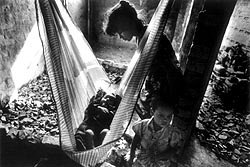
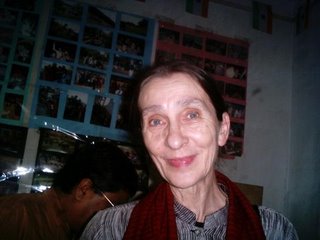
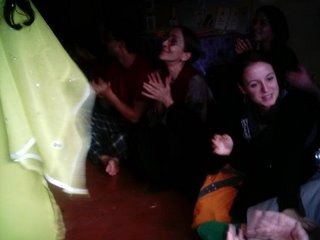













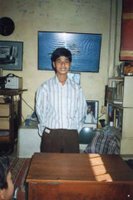



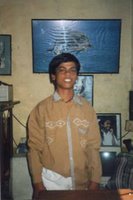

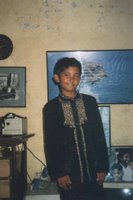

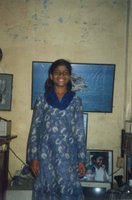
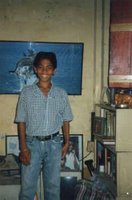


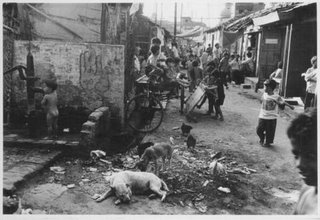 All my dawns cross the horizon
All my dawns cross the horizon